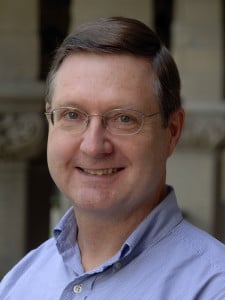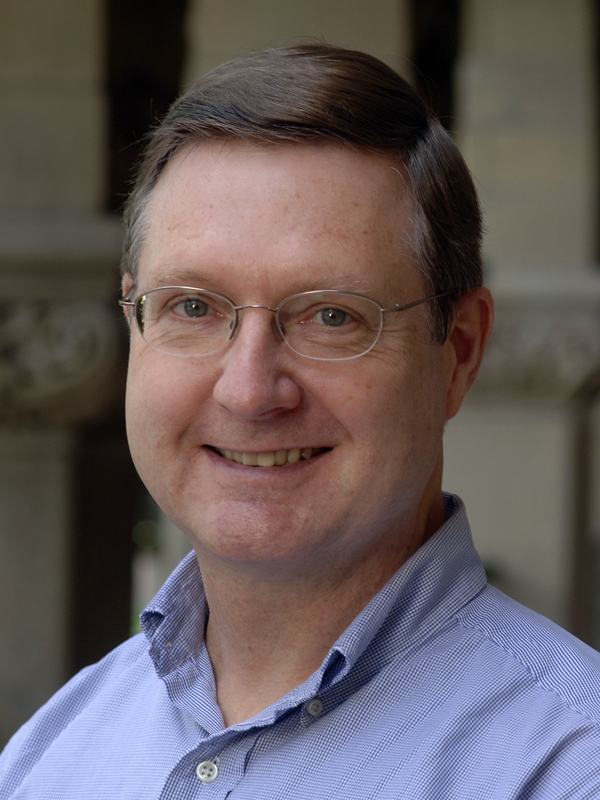
Korea expert shares experience, views on U.S.-Korea relations
Correction: The original version of this article incorrectly stated that David Straub is director of the Korean Studies Program. He is the program’s associate director. Gi-wook Shin is the director.
For a farm boy from southeast Kentucky, the odds of dining with Bill Clinton are about as good as the chances of feasting with Kim Jong-Il. But in the summer of 2009, David Straub, associate director of the Korean Studies Program at the Walter H. Shorenstein Asia-Pacific Research Center (APARC), did both as part of a small delegation sent to secure the release of two American journalists, Laura Ling and Euna Lee, who were held in North Korea for allegedly entering the country illegally.
“I wish I could say that I played a major role in the incident, but the very capable people in the U.S. government worked it out in an astute way and we were on the ground for less than 24 hours,” Straub said.
Straub, who had previously visited North Korea four times, was chosen for the mission because of his extensive knowledge of Korean culture and politics.
“Basically, I was there as a resource person. I could understand the Korean that the North Koreans were speaking so I could correct the interpretations,” Straub said. “I was able to reassure our people that what the North Koreans were proposing was not a problem.”
Straub also recalled giving the two journalists some gastronomical advice following their release–no doubt feeling like an expert on the subject following his fine dining with high dignitaries.
“On the way back to the United States…I advised the two women not to eat much of the greasy American food we had out on the table,” he said with a laugh. “They had been eating Korean food for many months, and if you suddenly change your diet like that, you can easily get sick.”
Straub brings both gastronomical and professional experience to his current position at Stanford’s Korean studies program, where he has worked since 2008. Thirty years of experience in the U.S. Foreign Service provide him with a unique perspective on academia.
“One thing that is special about APARC is that you have people like David [Straub] who come not from a purely academic background, but who are comfortable in an academic setting and who can bring the knowledge that they have gained in other places in their lives to the University,” said Daniel Sneider, associate director for research at APARC.
Growing up in southeastern Kentucky, Straub had few opportunities to travel but always longed to visit other countries. After graduating from the University of Louisville and attending graduate school at Harvard for a year, Straub left to join the Foreign Service and was assigned to work in Germany for two years. Building on his years of classroom German, Straub became fluent in the language by the end of his stay in the country.
“At that point, I was feeling pretty cocky and I thought that now that I’d learned a European language, I ought to tackle a really hard language,” he said.
In 1979, Straub was assigned a position in South Korea. Because speaking Korean was essential for his new role in the U.S. embassy, Straub attended a language school in Washington and later a top university in Seoul to master the difficult language.
Straub’s work in South Korea involved maintaining lines of communication with dissidents, student movements and Christian organizations involved in human rights and democratization efforts after the 1979 military coup. He regularly met with top opposition members and leaders during this “interesting and difficult time for South Korea.”
These everyday interactions with broad segments of Korean society would later serve Straub well in the classroom.
“Because of his almost perfect command of the Korean language, his extensive knowledge of Korean culture and especially his linguistic abilities, I felt a familiarity and a sense of intimacy with him,” said Youna Oh, a former student of Straub’s who is studying at Stanford as part of her overseas training for diplomacy in South Korea.
Straub recalled that following the 1979 military takeover many Koreans blamed the United States for not doing enough to prevent the coup and supporting dictator General Chun Doo-hwan.
He remembered that as a 28-year-old, it was frustrating to be one of the only people in contact with the opposition leaders. According to Straub, the U.S. ambassador rarely met with leaders of dissident groups, some of whom went on to lead the country following its return to democracy in 1987. This was in line with President Reagan’s policy, which emphasized communism and not totalitarianism as the real threat to peace.
“Traditionally, it has been a tenet of American foreign policy that people of our embassies should stay in contact with all legitimate members of society,” Straub said, expressing his disapproval of the strategy.
Straub would again experience the frustration of diplomatic intransigence during the Six-Party Talks on North Korean’s nuclear program from 2002 to 2004. Responsible for assembling the diplomatic briefing books for the negotiators, Straub remembered that the event was large and quasi-public, so carrying out successful negotiations was difficult. The first Bush administration was also determined not to have side negotiations with the North Koreans, which minimized the space for compromise.
“The world is a complex place. You can’t just take these rigid positions and be black and white all of the time,” Straub said, adding that the Bush administration would engage in more bilateral talks during its second term.
Now, as a teacher, Straub is able to foster dialogue and understanding among his students.
“We have students in our classes from China, Japan and South Korea among other places,” Straub said. “I think it’s great that future leaders like these can study this early in their career with people who have worked in the U.S. government and who are speaking to them frankly. I think it will make them more capable officials and on the whole will help improve U.S. relations abroad.”
Gea Kang ’11 said she believes many of the discussion and communication skills she gained from Straub’s tutelage help with the work she does in governance through a fellowship from the Haas Center for Public Service.
“I think it is difficult for any instructor to strike a balance between remaining substantive and fostering discussion, but Straub did a very good job navigating that effectively and patiently,” Kang said.
After his time in South Korea, Straub was stationed with the Foreign Service in various locations around the world. In Washington, he spent time writing guidance packets for press officers who often faced difficult questions about the Korean dictatorship’s alleged atrocities and use of torture.
When he assumed a position at the U.S. embassy in Japan, Straub found himself in a culturally fascinating environment, yet missed working in South Korea’s less mature political scene. After several years, Straub returned to Korea, where he worked on and off, accumulating almost 12 years of experience in the nation by the end of his diplomatic career.
By the time he shifted to academia in 2006, teaching initially at Johns Hopkins University before coming to Stanford, Straub was ready for a change.
“When you’re in government, you spend all day long going from meeting to meeting, dealing with the crisis du jour, and you spend a tremendous amount of time coordinating,” Straub said. “While it’s very interesting, it’s exhausting after a while and doesn’t allow you to focus deeply on one thing.”
At Stanford, Straub has been focused on researching topics related to North Korea. In April, he moderated an event at Stanford featuring two North Korean defectors who recounted harrowing stories of hardship in their country.
Straub found the event moving.
“In substance, I had heard similar stories, but when you hear it directly–especially from two young people–that’s very powerful,” he said.
Straub sees an important message in such events. He believes that Americans do not focus enough attention on the humanitarian issues in North Korea, although he acknowledges that this is in part due to the lack of free press. However, he also believes that American society as a whole is not well versed enough in international affairs.
But it is unlikely that Straub’s students will be caught unprepared by an international incident. In a class he co-teaches with his colleagues on U.S. policy in Northeast Asia, students are asked to produce memorandums that detail an appropriate response to a hypothetical crisis. The idea is for students to pretend they are National Security Council personnel and draft the paper accordingly.
“Even after working 30 years in government, that’s not an easy thing to do,” Straub said.
